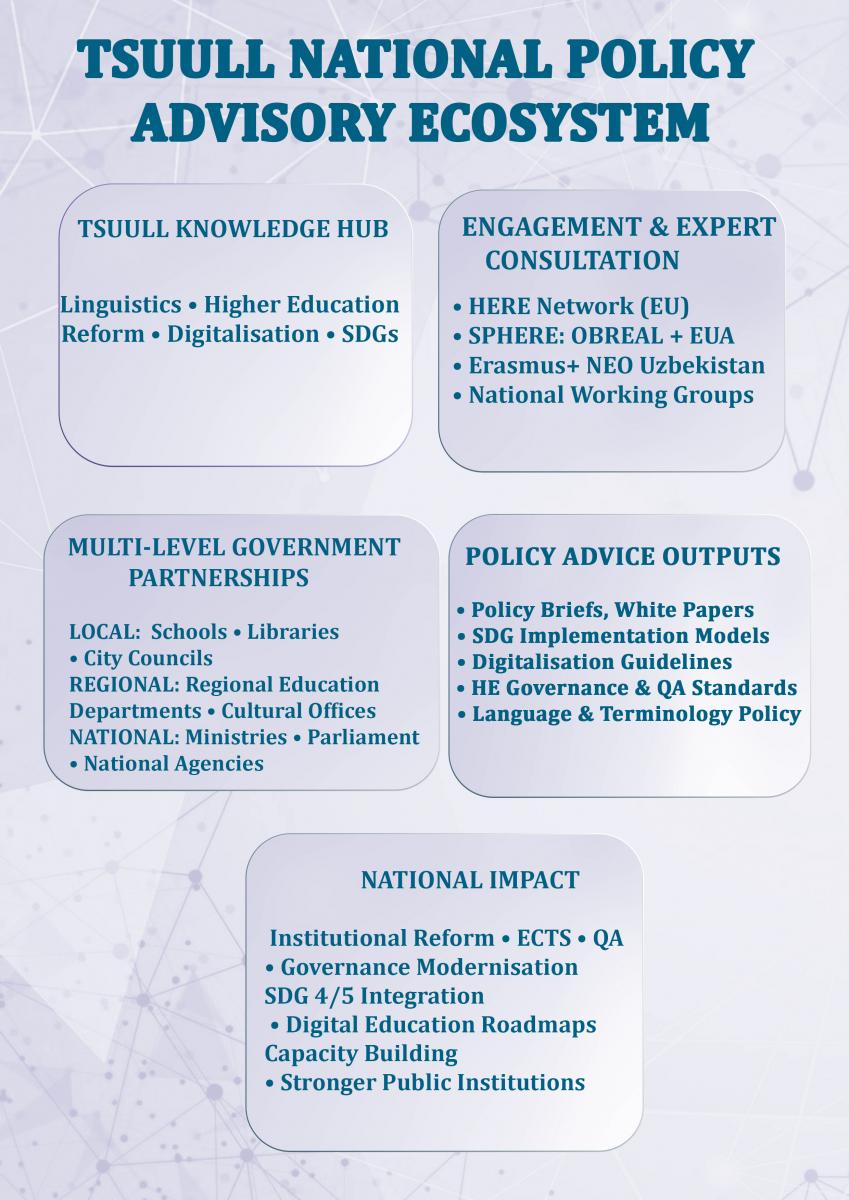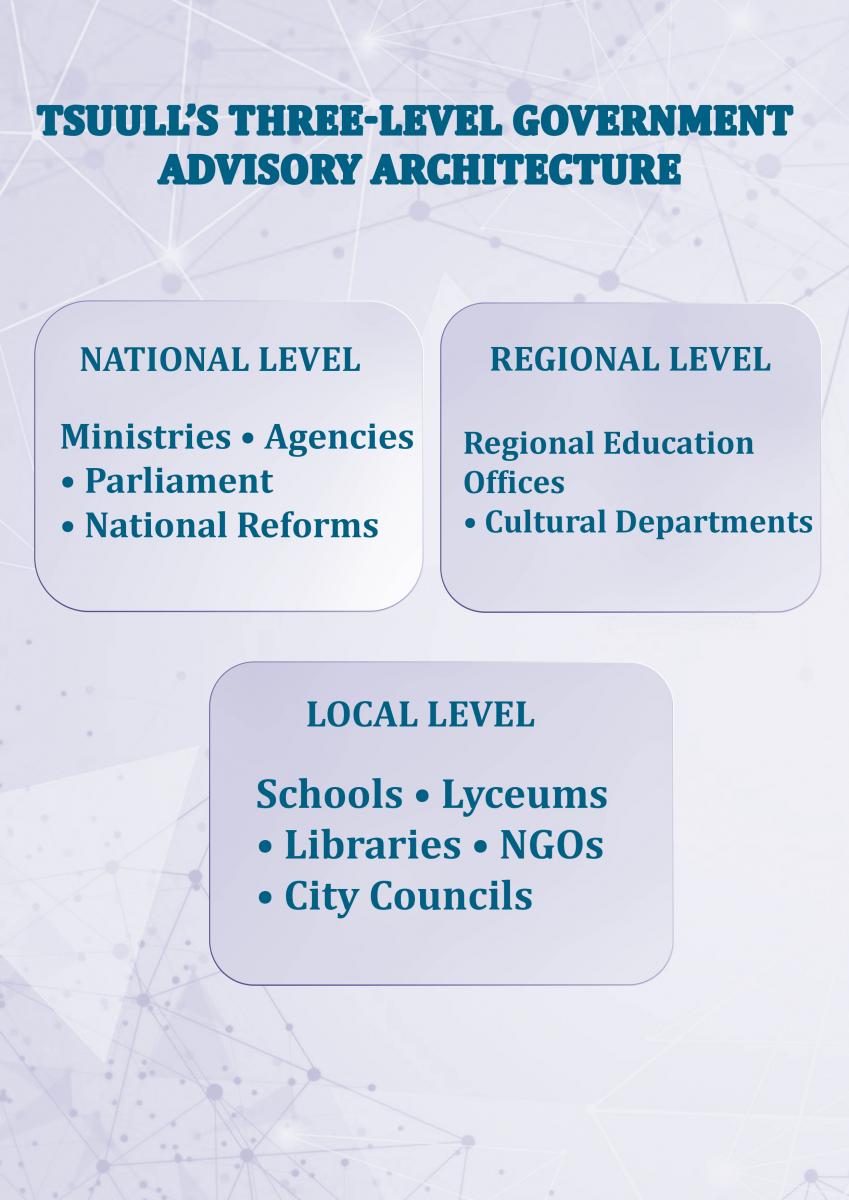Advancing Policy Through Expertise, Research, and Reform Leadership
TSUULL serves as a national centre of excellence in linguistic research, humanities, digital education, and educational reform. Beyond its academic mission, university plays an active advisory role to local, regional, and national government bodies contributing expert knowledge, evidence-based analysis, and policy recommendations that shape Uzbekistan’s social, cultural, and educational landscape.
As a member of the EU-funded Higher Education Reform Experts (HERE) Network and an active participant in the SPHERE (Support and Promotion for Higher Education Reform Experts) Initiative, TSUULL provides structured guidance on higher education modernization, governance, quality assurance, digital transformation, multilingual policy, cultural heritage preservation, and inclusive education aligned with global and national priorities.
TSUULL’s policy engagement is guided by three pillars: evidence-based research, strategic government collaboration, and international benchmarking, ensuring that Uzbekistan’s policy reforms align with European Higher Education Area (EHEA) standards and Sustainable Development Goals.
TSUULL’s Policy Engagement Framework
TSUULL’s contributions to national development follow a clear institutional model:
1. Participation in Government Committees and Working Groups
TSUULL academic leaders serve on expert councils, ministerial committees, and national working groups focused on:
• Higher education reform and quality assurance
• Digital transformation and e-learning policies
• Language policy and Uzbek language standardization
• Cultural heritage and manuscript preservation
• Anti-corruption education and ethical governance
• Youth policy, gender equality, and inclusion
• National SDG implementation
Through these roles, TSUULL experts contribute analytical insights, policy scenarios, and recommendations grounded in academic research and international evidence.
2. Provision of Evidence, Research, and Policy Papers
As part of its mandate, TSUULL regularly provides:
• Policy briefs on language planning, higher education modernization, and digital reform
• Analytical research on gender equality, youth development, and linguistic identity
• Sector assessments for ministries and national agencies
• Expert reviews for draft legislation, national programs, and strategic documents
• Monitoring reports for SDG-aligned educational reforms
This evidence-based input helps ensure that policy decisions are informed by rigorous analysis.
3. National Support through HERE Expertise
TSUULL’s Vice-Rector Prof. Dr. Nozliya Normurodova, is a long-standing member of Uzbekistan’s National Teams of Higher Education Reform Experts (HERE)
Her expert domains include:
• Quality Assurance and accreditation
• Recognition of qualifications
• Mobility frameworks
• 3-cycle Bologna model governance
• Higher education internationalisation
HERE’s national mission is to provide the Ministry of Higher Education, Science and Innovation with:
• Structured recommendations for higher education reform
• Alignment with European standards
• Support to national quality frameworks
• Expert analysis of modernization policies
• Technical assistance for universities across Uzbekistan
TSUULL therefore plays a decisive role in shaping the country’s higher education legislation and modernization agenda.
TSUULL’s Areas of Government Advisory Engagement
Drawing upon its academic strengths, TSUULL provides expert support in the following priority areas:
1. Linguistic Policy and Cultural Heritage Governance
TSUULL’s linguists, philologists, and digital humanities experts contribute to:
TSUULL’s Digital Linguistics Laboratory provides data-driven recommendations for modernising Uzbek language technologies, including corpus development and AI-based tools.
2. Education Reform and Quality Assurance
Through HERE, SPHERE, and Erasmus+ collaborations, TSUULL provides high-level advice on:
TSUULL’s contributions have directly supported major national changes, including the introduction of credit-modular systems, new accreditation practices, and digital transformation strategies in the education sector.
3. Policy Expertise for SDGs and National Strategies
TSUULL actively supports government institutions in implementing Uzbekistan’s SDG commitments through:
The university’s SDG platform and the “SDG5 Gender Equality Hub” serve as national models for integrating SDGs into higher education.
4. Social Policy Support and Community Engagement
TSUULL experts provide policy input in areas such as:
This engagement informs regional policymakers and strengthens community resilience.
5. Digitalisation and Innovation Advisory Support
TSUULL provides policy expertise in:
These contributions align with the Government’s Digital Uzbekistan 2030 strategy.
TSUULL’s Participation in National and International Policy Missions
TSUULL actively participates in policy-focused missions, seminars, and conferences that influence government decision-making, including:
These engagements ensure that TSUULL directly translates global knowledge into national policy recommendations.


TSUULL provides systematic expert support to district and city administrations, particularly in areas of culture, education, youth development, and gender equality. University specialists advise local authorities on the modernization of Uzbek language education, development of community literacy programmes, and implementation of gender-sensitive social initiatives. Through its SDG awareness campaigns and the work of the TSUULL Gender Studies Centre, the university supplies evidence for municipal programmes aimed at preventing gender-based discrimination and supporting women’s participation in community life. TSUULL’s linguists and cultural-heritage experts also collaborate with local museums and cultural departments on the preservation, digitisation, and promotion of local heritage sites, ensuring that city-level policies are grounded in academic research and aligned with national language and culture standards.
Nationally, TSUULL plays a recognised and formalised role in high-level government decision-making, contributing expert advice to ministries, policy councils, and thematic working groups. As an active member of the HERE Network and the EU-funded SPHERE Initiative, the university provides strategic recommendations on higher-education modernisation, Bologna alignment, qualification recognition, digital learning transformation, and external quality assurance frameworks. In 2024 alone, TSUULL participated in 25+ national consultations, prepared 12 policy papers, and contributed to 15 expert meetings with ministries, including the Ministry of Higher Education, Science and Innovation, the Ministry of Culture, and the Agency for Public Service Development. TSUULL’s scholars regularly review draft laws, national standards, state programmes, and SDG-related policies—particularly in SDG 4 (Quality Education) and SDG 5 (Gender Equality). Through its national SDG platforms, digital humanities projects, linguistic reforms, and gender-policy expertise, TSUULL ensures that Uzbekistan’s national strategies are supported by academic scholarship, international standards, and evidence-based analysis.
At the regional level, TSUULL experts collaborate closely with regional education departments, teacher training institutes, and cultural administrations. The university provides evidence-based input for regional strategies on youth development, lifelong learning, and teacher capacity building, conducting methodological workshops and policy training for educators across the regions. Through the HERE Network and Erasmus+ initiatives, TSUULL supports regional authorities in implementing credit-modular education reforms, strengthening internal quality assurance structures in regional HEIs, and advancing digital pedagogy practices. Philologists, historians, and digital humanities specialists contribute to regional language policy reforms, the creation of terminology databases, and the development of regional programmes on linguistic heritage and diversity. These collaborations help regional governments design more coherent, inclusive, and modern education and cultural policies.
Beyond national borders, TSUULL increasingly contributes expertise to international and intergovernmental organisations, reinforcing Uzbekistan’s global academic presence. Through Erasmus+ CBHE projects, the HERE Network, the Birsöz Initiative with Oxford, and multiple EU-funded platforms, TSUULL provides policy evidence and methodological input for cross-national discussions on higher-education reform, digital learning ecosystems, multilingual education, and gender equality strategies. University experts participate in international peer-learning activities, deliver presentations for EU policy forums, and contribute analytical reports used by European partner institutions for comparative education studies. TSUULL’s digital humanities work—especially its models for manuscript digitisation, corpus development, and open-access language resources—is referenced by international research groups and contributes to policy dialogues on cultural preservation and digital transformation. Through these engagements, TSUULL strengthens Uzbekistan’s visibility in the global academic community and ensures that international policy processes benefit from the university’s research-based insights.